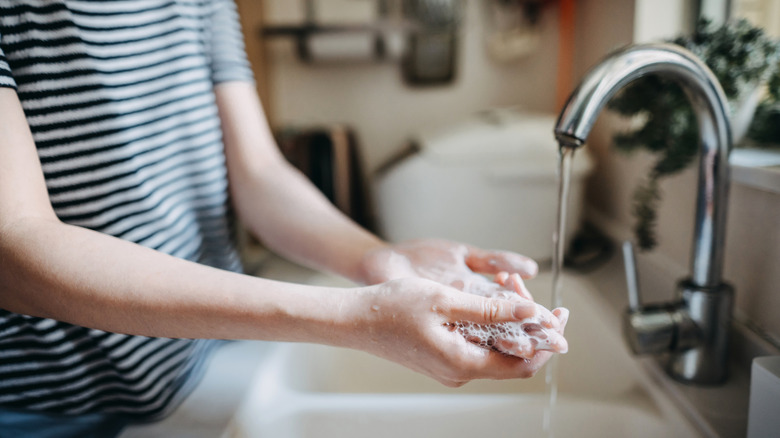The Largest Hand Soap Recall Recorded In Recent US History
The COVID-19 pandemic made most of us far more diligent about hand hygiene, whether it was washing our hands properly by scrubbing for 20 seconds or slathering on hand sanitizer. You might still keep bottles of soap by the sink or sanitizer in your bag, but it's worth taking a closer look at the labels.
(Read whether hand sanitizer is better than hand washing.)
The Food and Drug Administration has announced that DermaRite Industries is recalling several of its antiseptic hand soaps and lotions over possible bacterial contamination. For people with compromised immune systems, exposure to this type of bacteria could lead to bloodstream infections and potentially life-threatening sepsis. Even healthy individuals risk developing localized infections if the products are used on open wounds.
The initial recall in early August covered DermaKleen Lotion Soap, DermaSerra Topical Analgesic, KleenFoam Soap, and PeriGiene Antiseptic Cleanser. More than 40 lot numbers were involved in the recall. Distributors and customers who bought these products were emailed and told to destroy the affected products. DermaRite has since expanded the recall to include additional products, such as hand sanitizers, deodorants, and moisturizing creams, as a precaution.
Other DermaRite products involved in the recall
DermaRite added 32 more products to its expanded recall in late August. Among them are Clean-N-Free cleansers, DermaFungal antifungal cream, Gel Rite hand sanitizer, LubriSilk lotion, and UltraSure antiperspirants. The company's wound care and nutritional products are not part of the recall.
While some DermaRite products are sold over the counter or online, most are geared toward patients and caregivers in healthcare settings. The company says it has not received any reports of adverse events so far, but you should contact your doctor if you've experienced problems after using any of these products.
The suspected contaminant is Burkholderia cepacia. According to the Centers for Disease Control and Prevention, B. cepacia is commonly found in soil and water but can also cause infections in healthcare settings. Healthy people are generally at low risk, but those with weakened immune systems or chronic lung disease face the greatest danger. In vulnerable patients, B. cepacia can cause severe pneumonia within days but can also infect the blood, skin, and urinary tract. Treatment typically involves antibiotics, though many strains are resistant.

